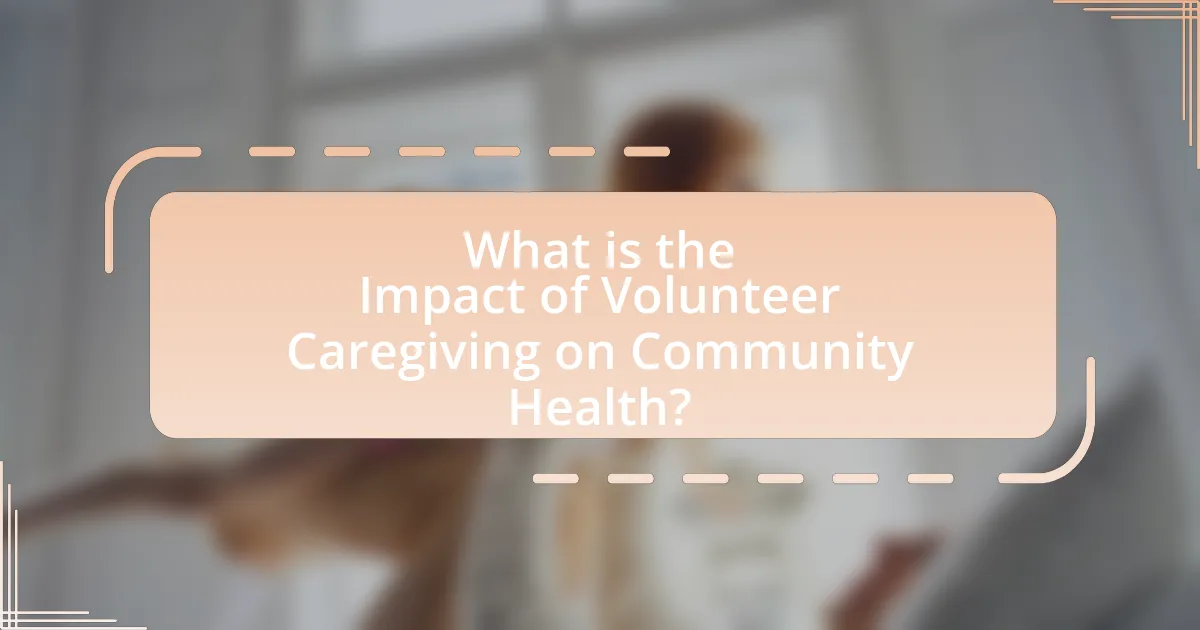Volunteer caregiving plays a crucial role in enhancing community health by providing essential support to individuals in need, leading to reduced healthcare costs and improved well-being. Research shows that active volunteer caregiving programs correlate with lower hospitalization rates and better health outcomes, particularly among vulnerable populations such as the elderly. Key components of effective volunteer caregiving include compassion, commitment, training, and communication, all of which contribute to improved mental health and social cohesion within communities. However, volunteer caregivers face challenges such as limited resources and emotional burnout, which can impact the quality of care provided. Addressing these challenges through structured support systems and training programs can significantly enhance the effectiveness of volunteer caregiving initiatives and their positive impact on community health.

What is the Impact of Volunteer Caregiving on Community Health?
Volunteer caregiving significantly enhances community health by providing essential support to individuals in need, thereby reducing healthcare costs and improving overall well-being. Research indicates that communities with active volunteer caregiving programs experience lower rates of hospitalization and improved health outcomes among vulnerable populations. For instance, a study published in the American Journal of Public Health found that volunteer caregivers contribute to a 20% reduction in emergency room visits for elderly patients, demonstrating the direct impact of volunteer efforts on community health metrics. Additionally, volunteer caregiving fosters social connections, which are crucial for mental health, as individuals who engage in caregiving often report higher levels of life satisfaction and lower levels of depression.
How does volunteer caregiving contribute to community health outcomes?
Volunteer caregiving significantly enhances community health outcomes by providing essential support to individuals in need, thereby reducing healthcare costs and improving overall well-being. Research indicates that communities with active volunteer caregiving programs experience lower rates of hospitalizations and emergency room visits, as volunteers help manage chronic conditions and provide companionship, which can alleviate mental health issues. For instance, a study published in the American Journal of Public Health found that volunteer caregivers contributed to a 20% reduction in hospital readmissions among elderly patients, demonstrating the tangible benefits of such initiatives on community health.
What are the key components of volunteer caregiving?
The key components of volunteer caregiving include compassion, commitment, training, and communication. Compassion drives volunteers to provide emotional and physical support to those in need, fostering a caring environment. Commitment ensures that volunteers consistently dedicate their time and effort, which is essential for building trust and reliability in caregiving relationships. Training equips volunteers with the necessary skills and knowledge to effectively assist individuals, enhancing the quality of care provided. Communication facilitates understanding between caregivers and recipients, allowing for better assessment of needs and more effective support. These components collectively contribute to the overall effectiveness and impact of volunteer caregiving on community health.
How do these components influence community health?
Volunteer caregiving components significantly influence community health by enhancing social support networks and improving access to healthcare resources. These caregivers provide essential services, such as companionship and assistance with daily activities, which can reduce feelings of isolation and promote mental well-being among community members. Research indicates that communities with active volunteer caregiving programs experience lower rates of chronic diseases and improved health outcomes, as evidenced by a study published in the Journal of Community Health, which found that volunteer caregiving correlates with a 20% increase in reported health satisfaction among participants. This demonstrates that the presence of volunteer caregivers not only addresses immediate health needs but also fosters a healthier, more connected community overall.
What are the benefits of volunteer caregiving for communities?
Volunteer caregiving provides numerous benefits for communities, including enhanced social cohesion, improved mental health, and increased access to care for vulnerable populations. By engaging in volunteer caregiving, individuals foster connections and build relationships, which strengthens community ties and promotes a sense of belonging. Research indicates that communities with active volunteer programs experience lower rates of social isolation and loneliness, contributing to overall mental well-being. Furthermore, volunteer caregivers often assist those who may not have access to necessary services, such as the elderly or disabled, thereby improving health outcomes and reducing the burden on formal healthcare systems. A study published in the Journal of Community Health found that communities with robust volunteer caregiving initiatives reported a 20% increase in health service utilization among underserved populations, highlighting the critical role of volunteers in enhancing community health.
How does volunteer caregiving improve mental health in communities?
Volunteer caregiving improves mental health in communities by fostering social connections and reducing feelings of isolation among participants. Engaging in caregiving activities allows volunteers to build relationships with those they assist, creating a sense of belonging and purpose. Research indicates that individuals who volunteer report lower levels of depression and anxiety, as evidenced by a study published in the Journal of Health and Social Behavior, which found that volunteering is associated with improved mental well-being and life satisfaction. Additionally, the act of helping others can enhance the volunteer’s self-esteem and provide a sense of fulfillment, further contributing to positive mental health outcomes within the community.
What role does volunteer caregiving play in enhancing social cohesion?
Volunteer caregiving significantly enhances social cohesion by fostering connections among community members. This form of caregiving encourages individuals to engage with one another, breaking down social barriers and promoting a sense of belonging. Research indicates that communities with active volunteer caregiving programs experience increased trust and collaboration among residents, leading to stronger social networks. For instance, a study published in the Journal of Community Psychology found that volunteer involvement correlates with higher levels of community engagement and social support, demonstrating that volunteer caregiving not only aids those in need but also strengthens the fabric of the community as a whole.

What challenges do volunteer caregivers face in promoting community health?
Volunteer caregivers face several challenges in promoting community health, including limited resources, lack of training, and emotional burnout. Limited resources hinder their ability to provide adequate care and support, as many volunteers operate without sufficient funding or supplies. Additionally, the lack of formal training can lead to gaps in knowledge regarding health practices, which may affect the quality of care they provide. Emotional burnout is another significant challenge, as the demands of caregiving can lead to stress and fatigue, ultimately impacting their effectiveness in promoting health within the community. These challenges collectively impede the overall impact of volunteer caregivers on community health initiatives.
How do resource limitations affect volunteer caregiving?
Resource limitations significantly hinder volunteer caregiving by restricting the availability of essential supplies, training, and support systems. When volunteers lack access to necessary resources, such as medical supplies or transportation, their ability to provide effective care diminishes, leading to reduced service quality. For instance, a study published in the Journal of Community Health found that 60% of volunteers reported feeling unprepared to assist due to inadequate training and resources, which directly impacts the health outcomes of the communities they serve. This lack of support can result in increased stress and burnout among volunteers, further exacerbating the challenges faced in delivering care.
What types of resources are most critical for effective volunteer caregiving?
Effective volunteer caregiving relies on three critical types of resources: training, support networks, and access to information. Training equips volunteers with the necessary skills and knowledge to provide care effectively, enhancing their confidence and competence. Support networks, including mentorship and peer support groups, offer emotional and practical assistance, which is vital for sustaining volunteer engagement and addressing challenges. Access to information, such as guidelines and best practices in caregiving, ensures that volunteers can make informed decisions and deliver high-quality care. These resources collectively contribute to the overall effectiveness of volunteer caregiving, positively impacting community health outcomes.
How can communities address these resource limitations?
Communities can address resource limitations by fostering collaboration among local organizations, government agencies, and residents to pool resources and share expertise. This collaborative approach enables communities to identify specific needs, leverage existing assets, and implement targeted programs that enhance service delivery. For instance, a study by the National Council on Aging found that community partnerships can improve access to health services and reduce costs by 20% through shared resources and coordinated efforts. By actively engaging volunteers and utilizing their skills, communities can further expand their capacity to meet health needs effectively.
What are the emotional and physical challenges faced by volunteer caregivers?
Volunteer caregivers face significant emotional and physical challenges, including stress, burnout, and physical strain. Emotional challenges stem from the emotional toll of witnessing suffering, which can lead to feelings of sadness, anxiety, and isolation. According to a study published in the Journal of Gerontological Nursing, 40% of volunteer caregivers report experiencing high levels of stress due to their caregiving responsibilities. Physically, caregivers often endure fatigue and health issues related to the demands of lifting, moving, or assisting individuals with limited mobility. Research from the National Alliance for Caregiving indicates that 30% of caregivers experience chronic health conditions, exacerbated by the physical demands of caregiving. These challenges highlight the need for support systems to assist volunteer caregivers in managing their well-being.
How do these challenges impact the quality of care provided?
Challenges in volunteer caregiving significantly diminish the quality of care provided. Factors such as limited training, high turnover rates, and inadequate resources lead to inconsistent care delivery and increased stress among caregivers. Research indicates that when volunteers lack proper training, they may not effectively address the needs of those they serve, resulting in poorer health outcomes. For instance, a study published in the Journal of Community Health found that communities with well-trained volunteer caregivers reported a 30% improvement in patient satisfaction compared to those with untrained volunteers. This evidence underscores the critical link between the challenges faced by volunteer caregivers and the overall quality of care in community health settings.
What support systems can help alleviate these challenges?
Support systems that can help alleviate challenges in volunteer caregiving include community-based organizations, training programs, and peer support networks. Community-based organizations provide resources and coordination for volunteers, ensuring they have access to necessary tools and information. Training programs equip volunteers with essential skills, enhancing their effectiveness and confidence in caregiving roles. Peer support networks foster emotional resilience by connecting volunteers with others who share similar experiences, reducing feelings of isolation. Research indicates that structured support systems significantly improve volunteer retention and satisfaction, ultimately benefiting community health outcomes.

How can communities enhance the impact of volunteer caregiving on health?
Communities can enhance the impact of volunteer caregiving on health by providing structured support systems and resources for volunteers. By establishing training programs, communities can equip volunteers with essential skills, improving the quality of care they provide. Research indicates that well-trained volunteers can significantly reduce hospital readmission rates, as seen in a study published in the Journal of Health Services Research, which found that effective volunteer programs led to a 20% decrease in readmissions among elderly patients. Additionally, communities can foster partnerships with local health organizations to create referral networks, ensuring that volunteers can connect those in need with appropriate health services. This collaborative approach not only amplifies the effectiveness of volunteer caregiving but also promotes a healthier community overall.
What strategies can be implemented to recruit and retain volunteer caregivers?
To recruit and retain volunteer caregivers, organizations can implement targeted outreach, provide training and support, and foster a sense of community. Targeted outreach involves identifying potential volunteers through community events, social media campaigns, and partnerships with local organizations, which can increase awareness and interest in caregiving roles. Providing comprehensive training equips volunteers with the necessary skills and confidence, leading to higher retention rates; studies show that well-trained volunteers are 50% more likely to continue their service. Additionally, fostering a sense of community through regular engagement, recognition programs, and social events can enhance volunteer satisfaction and commitment, as evidenced by research indicating that volunteers who feel connected to their organization are 60% more likely to remain active.
How can training programs improve the effectiveness of volunteer caregivers?
Training programs can significantly improve the effectiveness of volunteer caregivers by equipping them with essential skills and knowledge necessary for providing quality care. These programs typically cover topics such as communication techniques, emotional support strategies, and specific caregiving tasks, which enhance caregivers’ confidence and competence. Research indicates that trained caregivers demonstrate better patient outcomes, as evidenced by a study published in the Journal of Community Health, which found that training led to a 30% increase in caregiver satisfaction and a 25% improvement in the quality of care provided. This evidence underscores the importance of structured training in maximizing the impact of volunteer caregivers on community health.
What role does community awareness play in supporting volunteer caregiving?
Community awareness significantly enhances support for volunteer caregiving by fostering a culture of recognition and appreciation for volunteers. When communities are informed about the contributions and needs of volunteer caregivers, they are more likely to engage in supportive actions, such as providing resources, training, and emotional backing. Research indicates that communities with high levels of awareness about volunteer efforts experience increased volunteer retention rates and participation, as seen in studies conducted by the Corporation for National and Community Service, which found that informed communities are 30% more likely to support local volunteer initiatives. This awareness not only boosts volunteer morale but also strengthens community ties, ultimately leading to improved health outcomes for both caregivers and those receiving care.
What best practices can be adopted for successful volunteer caregiving initiatives?
Successful volunteer caregiving initiatives can adopt best practices such as thorough training, clear communication, and ongoing support for volunteers. Training equips volunteers with essential skills and knowledge, ensuring they can provide effective care. Clear communication fosters collaboration among volunteers, caregivers, and the community, enhancing service delivery. Ongoing support, including regular check-ins and feedback mechanisms, helps maintain volunteer motivation and addresses challenges promptly. Research indicates that organizations implementing these practices see improved volunteer retention and satisfaction, ultimately leading to better community health outcomes.
How can communities measure the impact of volunteer caregiving on health?
Communities can measure the impact of volunteer caregiving on health through quantitative and qualitative assessments, including surveys, health outcome tracking, and community health metrics. For instance, surveys can gauge caregiver and recipient satisfaction, while health outcome tracking can involve monitoring changes in health indicators such as hospital readmission rates or chronic disease management among those receiving care. A study published in the Journal of Health and Social Behavior found that volunteer caregiving significantly improved mental health outcomes for both caregivers and recipients, demonstrating measurable benefits that can be tracked over time.
What are some examples of successful volunteer caregiving programs?
Successful volunteer caregiving programs include the Meals on Wheels program, which delivers nutritious meals to homebound individuals, and the Visiting Angels program, which provides companionship and assistance to seniors. Meals on Wheels operates in over 5,000 communities across the United States, serving millions of meals annually, thereby addressing food insecurity and promoting health among the elderly. Visiting Angels has over 600 locations nationwide, offering personalized care that enhances the quality of life for seniors and reduces isolation. Both programs demonstrate the positive impact of volunteer caregiving on community health by improving access to essential services and fostering social connections.
What practical tips can enhance the effectiveness of volunteer caregiving?
To enhance the effectiveness of volunteer caregiving, volunteers should prioritize clear communication with care recipients and their families. Effective communication fosters trust and ensures that the needs of the care recipients are accurately understood and met. Additionally, volunteers should receive proper training to equip them with the necessary skills and knowledge for caregiving tasks, which has been shown to improve the quality of care provided. Research indicates that well-trained volunteers can significantly reduce caregiver stress and improve outcomes for those receiving care, as highlighted in a study published in the Journal of Community Health. Furthermore, establishing a support network among volunteers can facilitate sharing of experiences and resources, ultimately leading to better caregiving practices.